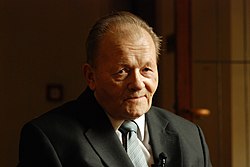|
Antonín Holý
Antonín Holý (1 September 1936 – 16 July 2012) was a pioneering Czech scientist. He specialised in the field of chemistry and cooperated on the development of important antiretroviral drugs used in the treatment of HIV and hepatitis B.[1] He was involved in the creation of the most effective drug (as of early 2009) in the treatment of AIDS.[2] Antonín Holý is the author of more than 450 papers, 400 scientific discoveries and holds 60 patents.[3][4][5] With more than 400 discoveries to his credit, his work has affected millions of people with viral diseases such as HIV/AIDS and hepatitis B and many other viral diseases.[6] In 2008 he received an Honorary Professorship at the University of Manchester's School of Chemistry.[7] Scientific careerBorn in Prague, Czechoslovakia, Antonín Holý studied organic chemistry from 1954 to 1959 at the Faculty of Science of Charles University in Prague. From 1960 he trained at the Institute of Organic Chemistry and Biochemistry (IOCB) of the Czechoslovak Academy of Sciences in Prague and had been a researcher there since 1963. He became the Institute's lead scientist in 1967, and from 1983 headed its working group for nucleic acids. In 1987 he became chief of the Department of Nucleic Acid Chemistry and from 1994 to 2002 he was head of the IOCB. Since 1976 he had collaborated on the development of new antiretroviral drugs with Erik De Clercq of the Rega Institute for Medical Research at the Catholic University of Leuven, Belgium.[8] His key contribution is the synthesis of nucleotide analogues, synthetic mimetics of the building blocks of RNA and DNA, that have found utility as inhibitors of viral replication. These include Tenofovir, Adefovir and Cidofovir.[9] Although ineffective as originally synthesized by Holy because of impermeability conferred by the negative charged phosphonate, conjugation with POM and POC pro-drug moieties developed by David Farquhar at M.D. Anderson Cancer Center, has made these nucleotide analogues into clinically effective drugs for the treatment of Hepatitis B (biPOM-Adefovir, Hepsera), and biPOC-Tenofovir Tenofovir. Together, these drugs have made a dramatic impact for the treatment of HIV. In particular, Truvada has shown exceptionally useful in preventing HIV transmission and thus has not only helped countless HIV patients, but has in fact prevented countless other healthy individuals from contracting the disease in the first place. In 2006 the US biopharmaceutical company Gilead Sciences, under the direction of Tomáš Cihlář,[10] and the Institute of Organic Chemistry and Biochemistry (IOCB) of the Academy of Sciences of the Czech Republic jointly established a new research center, oriented to the development of new preparations.[8] Gilead promised the IOCB a $1.1 million donation, to fund its operations and research for 5 years.[8] Several antiretroviral drugs based on Holý's discoveries have been licensed. In 1996, Vistide was approved for production in the United States and European Union. Viread (tenofovir) was approved in the US in 2001 for the treatment of AIDS, and Hepsera was approved in 2003 for the treatment of hepatitis B. Truvada, a combination of Viread and emtricitabine, was approved in 2006 for use in the USA.[11] DeathHolý had retired a year before his death and died of an unspecified cause, aged 75, on 16 July 2012. A statement from the IOCB called his death "an immense loss".[12][13] His death occurred two months after the U.S. Food and Drug Administration (FDA) approved Truvada for treating HIV.[6] Awards and honours
See alsoReferences
External linksWikimedia Commons has media related to Antonín Holý. |
||||||||||||||||||||||||
